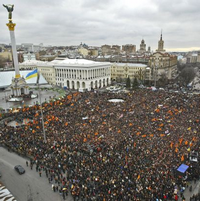As the dust settles from the first round of Ukraine's 2010 presidential elections, two things are clear: First, the hero of the Orange Revolution of 2004, Viktor Yushchenko, was decisively defeated; and second, both of the run-off contenders, Yuliya Tymoshenko and Viktor Yanukovych, are likely to follow through on pledges to improve relations with Russia if elected.
The last time Ukrainians went to the polls to select a president, the battle between Yushchenko and Yanukovych was portrayed as an apocalyptic clash, presenting a momentous choice for Ukrainians between a bright future with the West and a return to its post-Soviet embrace of Russia. Gallons of ink have been spilled over the last six years explaining why Ukraine's subsequent attempts to consummate the promise of closer integration into the Euro-Atlantic world ultimately failed.
But there hasn't been much soul-searching in Western capitals, where it has been much easier to point the finger -- at squabbling Ukrainian politicians, who were unable to unite to form an effective government that could pursue reforms, or at Russia's dark machinations to retain Ukraine within its sphere of influence (notably through the economic leverage of natural gas). The West's own complicity in Ukraine's failures is left unmentioned.

